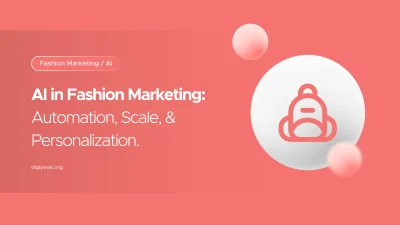
AI in Fashion Marketing: Automation, Personalization, Scale
In an industry that moves at the speed of culture, staying still means falling behind. …
24/05/2023 -
9 dk okuma
Stay up to date with Peakers
The term “artificial intelligence” (AI) has recently become popular in the corporate sector, and with good reason. The importance of AI for the future of employment cannot be overstated, as this technology has the potential to radically alter the way organizations are run. Development of artificial intelligence will help humanity and the future of AI is inevitable.
“What will artificial intelligence change in the future?” is on everyone’s mind. In this article, we will discuss the impact that artificial intelligence (AI) is having on the business world, how organizations are using AI to increase productivity, customer happiness, and innovation, and how enterprises can get ready for the AI-powered future with Digipeak.
The term “AI technology” is used to describe the wide variety of tools and methods that go into the development and deployment of AI systems. This encompasses a wide range of disciplines, from robotics and computer vision to machine learning and NLP. Systems that can recognize images, comprehend voice, and make judgments based on complex data are being developed with the help of artificial intelligence technologies.
The adoption of AI in the commercial world has been on the rise in recent years. AI used in business is being utilized to automate routine operations, enhance decision-making, and personalize the customer experience. Machine learning, NLP, and computer vision are just some of the artificial intelligence (AI) technologies being utilized to address difficult challenges in the banking, medical, retail, and manufacturing sectors. There are many benefits to AI in business.
Businesses of all sizes and across a wide range of sectors are taking advantage of AI’s meteoric development to enhance their operations, decision-making processes, and customers’ overall experiences. The artificial intelligence business is creating ripples in practically every industry as companies across the board use its potency to increase efficiency, production, and innovation.
Businesses now have access to options that were previously beyond their reach, thanks to AI for business. Using AI-enabled chatbots to deliver round-the-clock customer service has increased satisfaction while decreasing overhead with AI business solutions. AI solutions for businesses are also being used to sift through mountains of data and unearth hidden patterns. Because of artificial intelligence in business, we are now able to make more informed decisions, work more efficiently, and cut costs.
AI has revolutionized business intelligence. Business artificial intelligence used to be restricted to looking at historical data for patterns. AI business allows organizations to evaluate data in real time to make better decisions. Through the use of real-time data provided by AI-powered dashboards and predictive analytics tools, businesses are gaining a competitive advantage through artificial intelligence in business intelligence. Currently, business intelligence replaced the term with its role being to change business methods.
The effects of AI on business have been enormous and far-reaching. Artificial intelligence (AI) technology has revolutionized company operations by streamlining procedures, enhancing decision-making, and providing an edge in the marketplace. With the help of business and AI, firms may automate low-value, time-consuming operations so that workers can focus on more strategic work.
With the help of the benefits of artificial intelligence in business, businesses may gain a more in-depth understanding of their operations and their consumers, allowing them to make more well-informed decisions and provide more personalized products and services. Problems with employment, ethics, and responsibility are only a few of the issues that have been raised in relation to the widespread implementation of AI impact on business.

There are a number of ways in which artificial intelligence for business is useful to organizations. Here is how AI helps businesses:
Take Advantage of Automation with Artificial Intelligence!
How can you use your time more efficiently? Artificial intelligence saves you time by automating repetitive tasks. Learn how you can leverage AI to accelerate your business processes.
These days, even small businesses can use artificial intelligence (AI). Business AI is now accessible to small businesses, allowing them to enhance operations, boost efficiency, and gain a competitive edge. Tools driven by artificial intelligence can aid AI for small businesses in many areas, including customer service, sales and marketing, and even financial management.
AI-powered marketing solutions, such as chatbots, can help small firms evaluate consumer data and better target their marketing campaigns, while chatbots can help large organizations deliver 24/7 customer support without the need for additional people. AI and business can also help small organizations automate monotonous operations, freeing up staff time for strategic work.
There are many positive impacts of artificial intelligence. Among the many uses of artificial intelligence in business in a wide range of sectors are:
Artificial intelligence’s purpose in the corporate world is to boost effectiveness, output, and creativity. Artificial intelligence (AI) may save businesses time and effort by automating mundane processes; it can also help them better understand their operations and their customers; and it can give them a leg up in the marketplace. Automation effects on jobs, optimization, and new ideas made possible by AI can help firms maximize efficiency, cut costs, and boost profits.
When it comes to making business decisions, “business analytics” is the term for the process of relying on data and statistical analysis. As big data continues to gain traction, businesses are turning to artificial intelligence in the form of business analytics to help them make sense of the mountain of data they’re generating.
Business analytics solutions backed by artificial intelligence can help companies spot patterns and insights that might otherwise go undiscovered. To determine which items bring in the most revenue, for instance, or to spot patterns in customer behavior, AI in business analytics can be put to good use in a number of contexts. Business analytics systems powered by AI can also automate data processing for increased efficiency and precision.
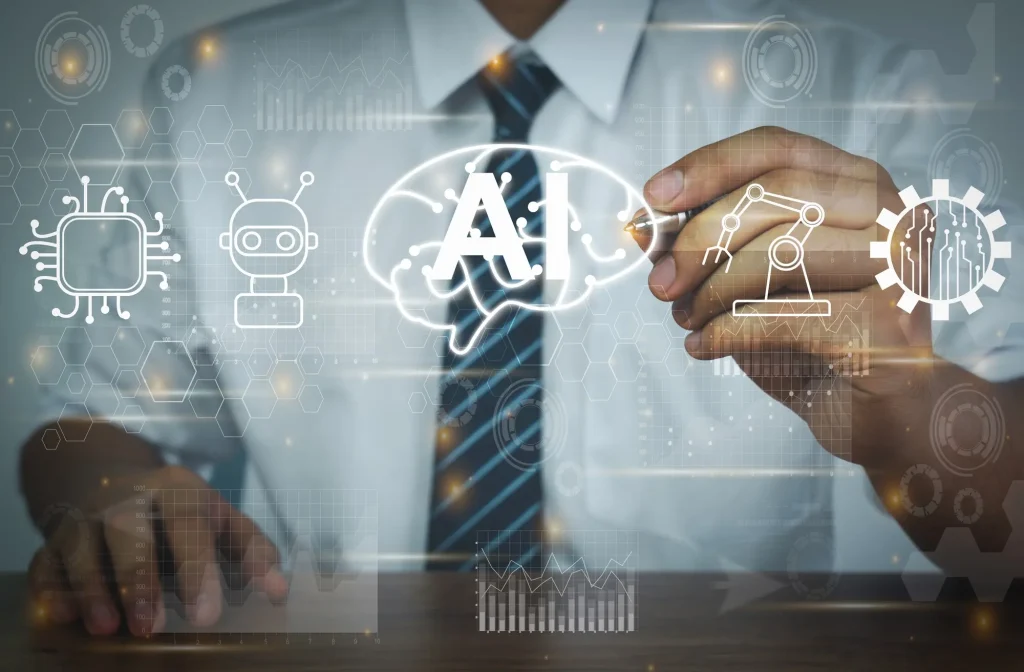
Artificial intelligence will have a profound effect on business strategies. Organizations must evaluate how AI technology will impact their operations and how they might use it to achieve a competitive edge as it improves and becomes more accessible. AI can help businesses find new opportunities, automate procedures, and make better decisions. But it can also disrupt traditional business models, put people out of work, and cause new ethical and regulatory problems. Future professions may change.
To be ready for the effects of AI, businesses need a long-term plan that details how they will integrate AI into their operations, the risks they face, and the steps they will take to reduce those risks. Business leaders, IT specialists, and legal and compliance experts should collaborate on this approach.
There are several applications of businesses using artificial intelligence, such as:
These using AI in business cases illustrate the versatility and value of AI for businesses in the corporate setting.
Most companies today keep data for future use in a variety of digital storage formats. To store and access data remotely from any device with an internet connection, most businesses turn to cloud-based storage options like Google Drive, Dropbox, or Microsoft OneDrive. Businesses of all sizes can profit from cloud storage because of its flexibility, low cost, and simple collaboration features with uses of ai.
When it comes to storing and backing up their data, many companies employ both cloud storage and on-premises storage options like servers and external hard drives. While on-premises storage provides more privacy and protection for your data, it can be more expensive and time-consuming to manage.
Working with pre-trained artificial intelligence that is stored in the cloud has many advantages. Without the need for substantial data preparation or algorithm creation, cloud-based AI platforms offer a variety of pre-built models and tools that may be simply integrated into business processes. This can aid companies in speeding up their AI projects, which in turn will decrease their time to market and increase their flexibility. And because of their adaptability and scalability, cloud-based AI solutions help organizations adapt rapidly to shifts in demand.

In conclusion, AI is causing profound shifts in the corporate sector. Making better decisions, working more efficiently, and cutting costs were all previously unattainable without an artificial intelligence future. Despite worries about AI’s possible detrimental impact on employment, the technology is also anticipated to generate new job opportunities and enhance productivity. Companies that are ready to compete in the AI-driven future will have a leg up on the competition.
The AI-supported digital marketing services such as content marketing, SEO, social media management, and creative design that Digipeak delivers to its customers help firms contact their target audiences more efficiently and acquire a competitive advantage in the digital realm. Digipeak’s creative team’s integration of artificial intelligence technology with digital marketing services is intended to give an even more effective solution to its customers. If you want to know how our AI-powered solutions may help you plan for the future with growth marketing methods, contact Digipeak.
Get an Offer


Join Us So You Don't
Miss Out on Digital Marketing News!
Join the Digipeak Newsletter.
Related Posts

In an industry that moves at the speed of culture, staying still means falling behind. …
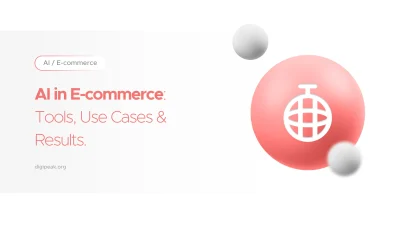
Do you recall when "Artificial Intelligence" in e-commerce was little more than a basic chatbot? …
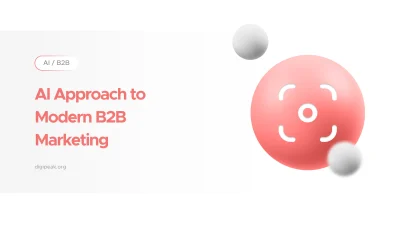
The year is 2026. The digital marketing playbook from just a couple of years ago …
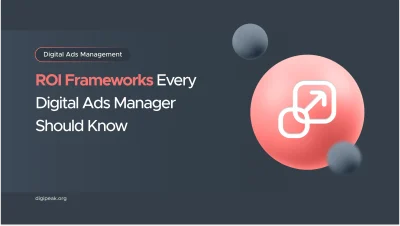
Before we explore the new frameworks, let's face the reality of our current environment. The …